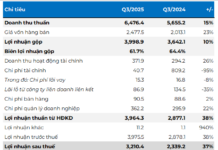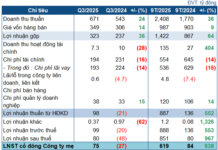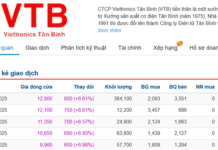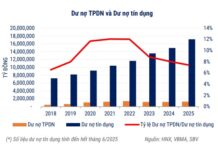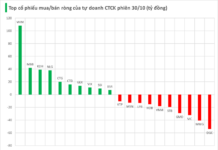Eliminating the practice of “Blowing the Whistle while Playing Soccer”
Recently, when advising on the amendment of Decree 24, the State Bank of Vietnam’s Ho Chi Minh City branch proposed a series of suggestions and recommendations for the State Bank of Vietnam to consider, study and develop policy mechanisms and regulations to limit the risk of cash payments for buying gold. This proposal aims to prevent risks and potential issues in the gold trading activities of businesses, gold trading units, and ensure compliance with anti-money laundering regulations.
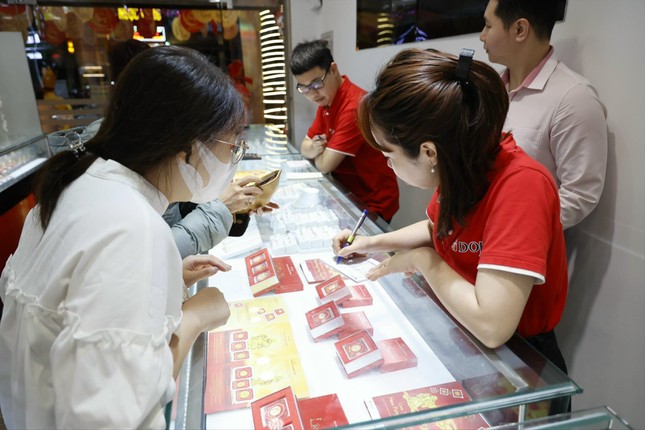
The monopoly of SJC gold raises the price of gold. Photo: Nhu Y.
In addition, the State Bank of Vietnam’s Ho Chi Minh City branch also proposed to consider appropriate management mechanisms to avoid monopolies and group interests for gold trading units that voluntarily quote prices.
In an interview with PV Money, Nguyen The Hung, Vice Chairman of the Vietnam Gold Business Association, said that according to the current regulations on anti-money laundering, organizations and individuals conducting gold transactions worth over 400 million VND (approx. $17,300) must report to the State Bank of Vietnam. “The government’s policy is to promote non-cash payments. I think the legal framework is already in place, and gold cannot be an exception. Therefore, the above proposal will not have much impact on the gold market,” Mr. Hung said.
According to Hung, the key issue in managing the gold market lies in the monopoly and import of gold. Previously, the Vietnam Gold Business Association raised many concerns with the State Bank of Vietnam regarding the amendment of Decree 24 on this issue. Currently, in the decree, the State Bank of Vietnam participates in gold trading and production to supply the market. Accordingly, the State Bank of Vietnam has both a monopoly on gold import and export and a monopoly on the production of SJC gold bars.
“So, the State Bank of Vietnam is currently both the player and the referee. The state should only manage, not do business…,” Hung said.
Hung added that the State Bank of Vietnam cannot provide raw gold because to have gold for production, it must be imported. To import gold, it must use foreign exchange reserves. Accordingly, the State Bank of Vietnam cannot intervene in the market by using foreign currency to buy gold.
“The fact that the State Bank of Vietnam does not allow the import of gold is within their rights. Because of this, there is no source. Meanwhile, the shortage of supply in the domestic market has caused the current increase in gold prices,” Hung said.
Vice Chairman of the Vietnam Gold Business Association affirmed that it is necessary to separate management and business and leave the business to the market. “Previously, there were up to 10 gold bar brands in the country, and there were no major price differences. Although SJC gold bars have the largest market share, people still have the right to choose different gold bar brands, and the price difference between gold brands is only a few tens of thousands of VND per tael. When applying Decree 24, there is only 1 gold bar brand, SJC, and people have no other choice,” Hung said.
Hung also added that Decree 24 has successfully prevented the “goldlization”. Nowadays, people no longer use gold for payments, nor do they excessively invest in gold as before, so it cannot be said that the economy is becoming gold-oriented.
The management agency should not be involved in gold trading
Hoang Van Cuong, member of the Finance and Budget Committee of the National Assembly, said that the management agency should not be involved in gold trading as it is now. In 2012, people used gold for payments, so the State Bank of Vietnam took up the monopoly. “I think this is a situational solution. However, now that gold is no longer a means of payment, there is no need for a monopoly,” Cuong said.
According to Cuong, all gold trading companies must be treated equally. “It is unreasonable that the price difference between SJC gold bars and other types of gold is over 10 million VND per tael. Once there is competition, there will be no compulsion, and gold prices will be balanced. If this is done, the price of SJC gold will immediately drop to the same level as other gold,” Cuong said.
Pham Xuan Hoe, former Deputy Director of the Institute for Banking Strategy Development, said that currently, the price difference between SJC gold bars and gold on the world market is up to 18 million VND per tael, and at times, it is close to 20 million VND per tael. “This is extremely unstable. This price difference affects the social psychology and can cause risks and negative impacts on the stability of financial markets, monetary markets, and the economy,” Hoe said and added that Decree 24, which manages the gold market, was issued 12 years ago and has resolved the “chaotic” situation of the gold market at the time. According to it, the State Bank of Vietnam is the exclusive agency for gold bar production, the exclusive agency in managing the import and export of raw gold for gold bar production, and SJC is the national gold brand.
“It must also be acknowledged that Decree 24 was issued in a timely manner and has had a quite good effect. Up to now, when the market has stabilized, gold is a type of goods, so the gold market needs to develop normally,” Hoe said.











